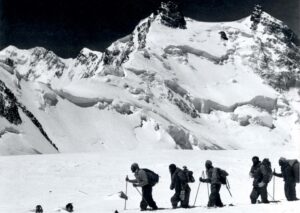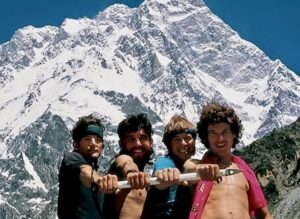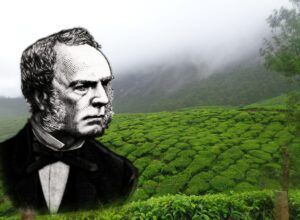Dubbed the last great imperial adventurer, Sir Francis Younghusband is ingloriously remembered for a savage slaughter of lightly armed Tibetans. The confrontation shamed the British Army, inciting the conclusion of the Anglo-Tibetan Treaty. Despite regretful wrongdoing, he was integral at mapping previously unchartered areas of Central Asia. Ironically, he later became known not just as a fearless explorer, but also something of a spiritualist.
Younghusband was born into a British military family in India in 1863. His upbringing was strict. At the age of 18, he entered the Royal Military College, where he received his first commission.
The Great Game was underway throughout Asia. Russia wanted to take hold of Britain’s power. Political confrontations were rife. The British Army had one overriding problem. Large unmapped portions of Asia rendered passage difficult.
Tough, driven
The driven Younghusband had a knack for assignments requiring austerity and strong negotiating acumen. In 1886, he took leave from the British Army and set off on his first expedition across Asia. His mission was to survey the unchartered Chambal Mountains and to detect the strength of the Russian Army.
Leaving Peking, Younghusband traveled on foot through Manchuria and the frontier areas of Chinese settlement around Changbal. He studiously documented the geography, returning information to the British Army. In particular, he found and chartered a new route through the vast Gobi Desert.
When Younghusband came to Changbai’s highest peak, he recognized a critical failing in previous reports. Baekdu Mountain was supposedly the region’s highest, but Younghusband discovered that it only reached 2,400m.
He braved a harsh winter in the Himalaya with little more than a rifle for protection. Younghusband was in his element. Already, he was considered an expert in Central Asia. Later, he became Tibet Frontier Commissioner.
Vigorous mapping expeditions
On his return, he walked through the inhospitable Taklamakan Desert to Chinese Turkestan. When he reached Kashgar, he pioneered a route through the previously uncharted Mustagh Pass to India. He proved the range to be the water divide between India and Turkistan. Mapping the Upper Oxus earned him a place in the Royal Geographical Society as the youngest-ever member. He was 24 years old.
His mapping had helped the British establish better trade routes. By 1889, Younghusband was Captain. Next, he set off to investigate an unchartered area north of Ladakh, escorted by a small group of Gurkhas.

India’s frontier with Tibet in the late 19th century.
During the expedition, he met his Russian counterpart in The Great Game, Bronislav Grombchevsky. The two formed a friendship. Their meeting aided Britain’s confidence in Younghusband. His superiors felt that he was able to disarm confrontation while making strategic decisions to benefit his country.
It was the beginning of his intense political career. Then in 1903, he embarked on the expedition for which he is mostly remembered.
Tibetan slaughter
Amid fears of Russian infiltration, breaches of treaties, and minor border disputes, Younghusband left in 1903-4 on a British Army expedition to Tibet. He was there to settle border disputes. But exceeding orders, his mission became an unbridled military force that was described as the invasion of Tibet.
On their way to Gyantse, a confrontation ensued outside the hamlet of Guru, 160km inside the Tibet border. Younghusband and his team were victorious, slaying the Tibetan side. But the battle was not a fair match.
The British troops used guns while the Tibetan militia only had swords. More than 600 Tibetans died, many of them monks. Only a handful of British troops perished in action.
The confrontation was a heavy blow to Younghusband’s reputation as a cool-headed diplomat. Britain was desperate for a positive relationship with the Qing government, to negotiate profitable trade agreements. The onslaught was embarrassing and overturned the Treaty of Lhasa, which Younghusband had previously obtained.
Despite his uncompromising actions, Younghusband received praise and honors. That same year, he became a Knight Commander of the Order of the Star of India. For the next five years, he served as a British representative in Kashmir. Promotion to Lieutenant Colonel came during that period.
A ‘premature hippie’ in his later years
After returning to Britain in his later years, Younghusband championed British interests in Central Asia. He was elected president of the Royal Geographical Society in 1919. Later, he became Chairman of the Mount Everest Committee. He supported George Mallory on his famous, fatal attempt on Mount Everest.
From the outset, Younghusband appeared conservative. But beneath the bluster, he was fiercely spiritual, a “premature hippie” who believed in extraterrestrials.
Return from his 1904 slaughter of Tibetans, Younghusband claimed to have had a mystical experience that suffused him with love for the world. His reformed status left him with feelings of guilt for his recent butchery.
Younghusband published a number of titles with New Age themes such as Life in the Stars: An Exposition of the View that on some Planets of some Stars exist Beings higher than Ourselves.
He long outlived the British Empire under which he served and died of heart failure in 1942.






